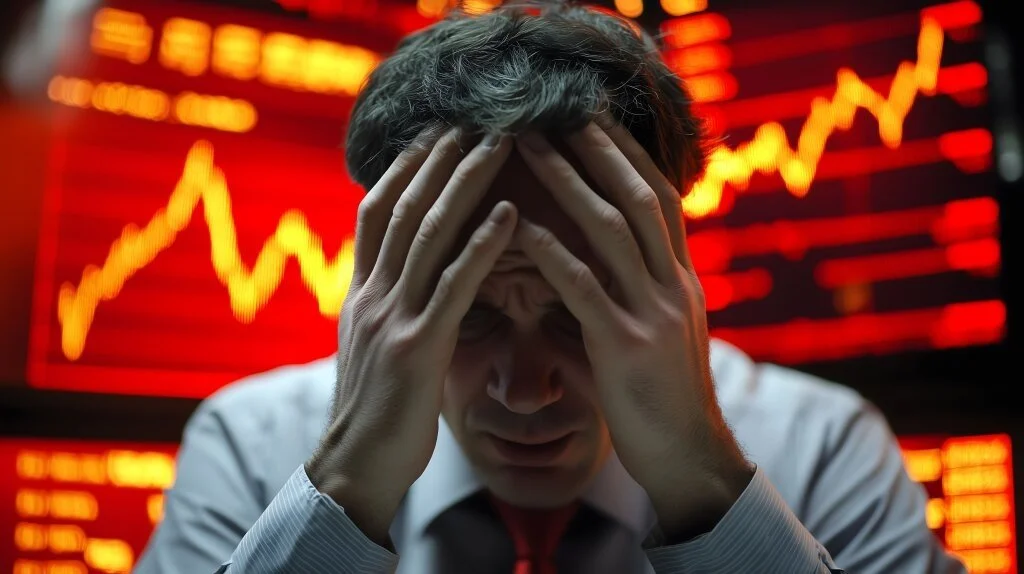How to Survive Market Panic: 5 Money Psychology Lessons
The São Paulo Stock Exchange (Bovespa) on Flickr.
Reading time: 8 minutes
Why Money Psychology Is Crucial During Today’s Market Turmoil
How Trump’s Tariff Policies Shook the Markets
Understandably, many retail investors across the globe are feeling anxious about the stock market volatility and unpredictable swings it has experienced over the last week. Indeed, we are witnessing in real time how a series of unpredictable events unfold. In our previous post, we provided detailed answers to frequently asked questions as to what exactly is happening with the stock market, why it is happening, and what we could expect moving forward.
The Trump Administration’s announcement of very high tariffs on dozens of countries around the world led to an immediate re-assessment of global stock prices. Tariffs directly impact stock valuations by affecting the expectation of future income from companies and by creating an uncertain trading environment focused on confrontation instead of open trade.
On April 7th, the stock market opened in many developed countries with 10%+ drops, before recovering slightly in some regions (e.g., Europe). That Monday represented the third consecutive day with daily losses hovering around 5%. It was then followed two days later by another unexpected Trump announcement—this time informing the world of a 90-day pause on most of the previously-announced tariffs.
This represents a 180-degree turnaround by the Trump administration, and it is widely speculated to be the result of the turmoil that was unexpectedly generated in the bond market resulting from these policies. Normally, when a stock markets drops, investors tend to flee to US bonds, which are considered to be safe. Not this time. Large bondholders started to move away from US treasuries, signaling that they may no longer perceive them to be the safe haven they once were. Some were moving to other bond markets (e.g., Germany).
We should still expect substantial uncertainty and volatility moving forward. At the time of writing, the 10% blanket tariff is still maintained across countries, and the tariffs with China continue to escalate more or less on a daily basis (currently at 145% as of April 11th). No one knows what will be the scenario one week from today—and this, of course, is not a good environment for stock market investors.
How Crisis Sparks Emotional Money Decisions
It is a well-known fact that retail investors don’t get their “fair share” of the stock market returns over time. And by fair share I mean the average stock market returns, which can be considered to be somewhere in the 6-8% range in real terms, depending on the period examined. Retail investors usually underperform the market average because of two main factors: first, many investors attempt to outperform the market by either engaging in stock picking or investing in high-fee actively managed funds.
Needless to say that both approaches are losing strategies for the vast majority of retail investors out there. But the second reason—and perhaps the more important one—is the behavioral response of investors during times of crisis. Everyone knows the theory—buy low, sell high, right? Yet, what ultimately ends up transpiring is the exact opposite. Why is this the case?
Investors’ greatest enemy is the management of their own emotions. It is easy to stay calm and collected when you are in the middle of a bull market run, perhaps even experiencing back to back, consecutive yearly returns of 20+%. In this environment, most investors feel like geniuses—whether they chose individual stocks, actively-managed funds, or preferred low cost, highly diversified index funds.
To explain this, today we bring in some key lessons from The Psychology of Money, a personal finance bestseller and an absolute must-read if you haven’t already. This book is easily one of the best personal finance books out there. Although we cover in detail each of the book’s chapters’ takeaways in a dedicated article, today we focus on the lessons that stand out to me as being particularly relevant to today’s current situation. The remainder of the sections of this article represent a relevant insight based on Morgan Housel’s book that is applicable to today’s market instability.
Businessman in despair holds his head in front of falling stock price. Source: CCNULL.
Recognize That Nobody is Crazy (Lesson #1)
People just face incredibly different experiences with money. Remember that what people experience throughout their lives is far more compelling than the theory they learn second-hand. It is reasonable to expect investors that come from different generations, grew up in different countries and family backgrounds, or were born into different economies to show the same understanding of money or of the stock market?
With the uncertainty around tariffs and shifting international policies, the stock market is understandably jittery. Some investors are pulling back into defensive sectors, gold, or cash, while others may be taking the exact opposite approach and be doubling down on tech or industrials, hoping for a rebound or a political resolution around the corner.
These two moves seem contradictory. But if we take Housel’s advice seriously and are not so quick to judge, we can see that these decisions are usually shaped by each investor’s personal history. Someone who already experienced major market crashes like the 2008 financial crisis—and the emotions that come with it—may be quicker to flee to safer positions in order to sleep better at night (although portfolio allocation decisions should really be done prior to high-volatility events, not during them!). In contrast, a younger investor who started investing in 2021 may have only experienced good returns so far and may think they are more comfortable with riding out volatility. Each decision—whether correct or not—is usually shaped by previous experience.
Nobody is crazy, so don’t be so quick to judge. Everyone has different attitudes and relationships with money and different mental models resulting from vastly different experiences—what seems crazy to some is perfectly rational to others.
Keep Calm and Focus On Saving Money (Lesson #10)
We should remind ourselves that, over time, our savings rate—the amount we manage to save and invest periodically from our net income—is more important in wealth-building than our stock market returns. Indeed, Housel argues that embracing a frugal lifestyle and finding contentment with less are also key actions to take towards achieving financial independence and building long-term wealth.
The author cleverly defined savings “as the difference between your ego and your income.” Let that sink in for a moment… you may then realize why so many people with very high incomes fail to save enough money. In line with this approach, in previous articles we have covered the importance of practicing “stealth wealth” and have strongly advocated for the pursuit of freedom over the crave for status.
Thankfully, you have much more control over your savings rate than over the stock market returns, so focus your energy on that first. If you view wealth building as always needing higher returns, your financial journey may be a hard and bumpy one—a path largely outside of your control. One of the risks here is being easily discouraged by short-term returns and not focus on the consistent saving and investing strategy.
Housel’s advice is refreshingly simple: you don’t have to predict, time, or outsmart the market—you just have to focus on consistent long-term saving and investing strategy. Right now, many investors are worried over tariffs, Fed policy, and economic slowdown. But someone with a high savings rate, who has been steadily investing through both bull and bear markets, is likely way ahead of the crowd. Even in today’s unpredictable market, the most powerful thing retail investors can do isn’t to predict short-term market movements, but to put your head down, stay the course, and try to maximize your savings and invest consistently.
Photo by Robb Miller on Unsplash.
Expect Surprises Along The Way (Lesson #12)
Acknowledge that financial markets are unpredictable by nature and learn how to adapt your personal finance strategy accordingly. Absolutely nobody could have foreseen the exact 2024-2025 mix of election-year volatility, AI boom, global conflict, and tariff escalations playing out the way they had recently. History really is the accumulation of very unpredictable events.
Yet many long-term investors that have long-term plans, including a portfolio asset allocation that aligns with their risk tolerance, are likely not only in good shape, but also sleeping well at night. And the reason is that they aren’t planning around specific predictions or revising in real time their portfolios in light of daily events. They were simply prepared for a wide range of uncertain events and accepted that volatility is the emotional cost of investing in volatile markets (see Lesson #15 below).
The key takeaway is that we shouldn’t try to outguess or outsmart the next stock market plot twist. Instead we should build a system that works because we know surprises will come—and, in fact, can make us stronger if we prepare to benefit from them. While it is useful to have an understanding of the past, if we rely on it too strongly—according to Housel—we may end up missing the key outlier events that will move the needle most in our favour in the future.
Adopting this mindset fosters patience, humility, and realistic expectations—all crucial in today’s volatile environment. Remember, most of what happens in the global economy can be tied back to a handful of past events that were impossible to predict. In finance, the further back in history we look, the more general our takeaways should be. And that is also because some structural changes in today’s world may mean past lessons from history could no longer be applicable moving forward.
Nothing Is Free—There’s Always a Cost to Investing (Lesson #15)
A key insight from Housel’s bestseller is that successful investing always demands a price. Unfortunately, some of the important costs don’t come with visible tags, especially when you’re starting out with investing. These costs are not provided in dollars, but expressed as volatility, fear, doubt, uncertainty, and regret. I think this lesson should be one of the most obvious ones to investors experiencing stock market volatility today. We’ve already seen 10+% falls in a single day—how did that make you feel?
Strong market volatility is challenging for many investors. Whether you are a value stock investor or a passive index fund investor, you will deal with some serious volatility and uncertainty ahead in your long-term investing journey. At times—perhaps like right now—it will be difficult to stomach. However, the sooner we internalize that this is one of the main price tags associated to investing the sooner we can move on.
Volatility, together with its associated emotional features, is a feature, not a bug—one that, with the right mindset, can actually become an advantage over time.
Those who avoid paying the price may end up paying double. Housel writes about how many investors try different shortcuts to avoid paying “the price” of uncertainty and volatility: either they chase after “easy returns” or try to time the market by jumping in and out of their holdings. Unfortunately, there is no free lunch when it comes to investing, and the data shows that investors engaging in these practices seriously underperform, on average, long-term, buy-and-hold investors.
Which Game Are You Playing? (Lesson #16)
This is another one of my favourite insights. According to Housel, we need to recognize that there are different types of investors in financial markets engaging in very different games. When investors have different goals and time horizons, prices that look outrageous to one investor can make perfect sense to another.
The factors different actors pay attention to are very different too. Day traders, hedge funds, pension managers, and others are playing by completely different rules and have different objectives and expectations than long-term retail investors saving for retirement in 15-20 years. Internalizing this concept may help with putting the dramatic news headlines into context. Some events may certainly affect and be critical to players that have quarterly time horizons in place, but this level of urgency simply may not apply to investors playing the long-term game.
The important takeaway is to understand at a deep level your own strategy and time horizon, so you are not at risk of being persuaded by the behaviors of investors playing other games. To illustrate, consider a semiconductor stock dropping sharply after the tariffs were announced. Of course some big players like hedge funds with short term horizons exit positions straight away, trying to protect their quarterly performance. But does the same logic underpinning this trade also make sense to a value stock investor looking at a 10-to-15 year investing window?
New York Stock Exchange Building, Manhattan, United States during Nighttime. Photo by Keenan Constance on Pexels.
What’s Your Investing Mindset? Share Your Thoughts Below
Which of the main takeaways from The Psychology of Money do you relate do the most? Do you have any other book or suggestion that could help other investors stay calm during market volatility? Please share with us in the comments below!
🌿 Thanks for reading The Good Life Journey. I share weekly insights on money, purpose, and health, to help you build a life that compounds meaning over time. If this resonates, join readers from over 100 countries and subscribe to access our free FI tools and newsletter.
👉 New to Financial Independence? Check out our Start Here guide—the best place to begin your FI journey.
Enjoyed this post? Don’t miss our article covering the importance of index funds in your financial independence journey or our insights on flexible withdrawal strategies for early retirement.
Disclaimers: I am not a financial adviser, and the content in this website is for informational and educational purposes only. Please consult a qualified financial adviser for personalized advice tailored to your situation.
About the author:
Written by David, a former academic scientist with a PhD and over a decade of experience in data analysis, modeling, and market-based financial systems, including work related to carbon markets. I apply a research-driven, evidence-based approach to personal finance and FIRE, focusing on long-term investing, retirement planning, and financial decision-making under uncertainty.
This site documents my own journey toward financial independence, with related topics like work, health, and philosophy explored through a financial independence lens, as they influence saving, investing, and retirement planning decisions.
Join readers from more than 100 countries, subscribe below!
Didn't Find What You Were After? Try Searching Here For Other Topics Or Articles:


































